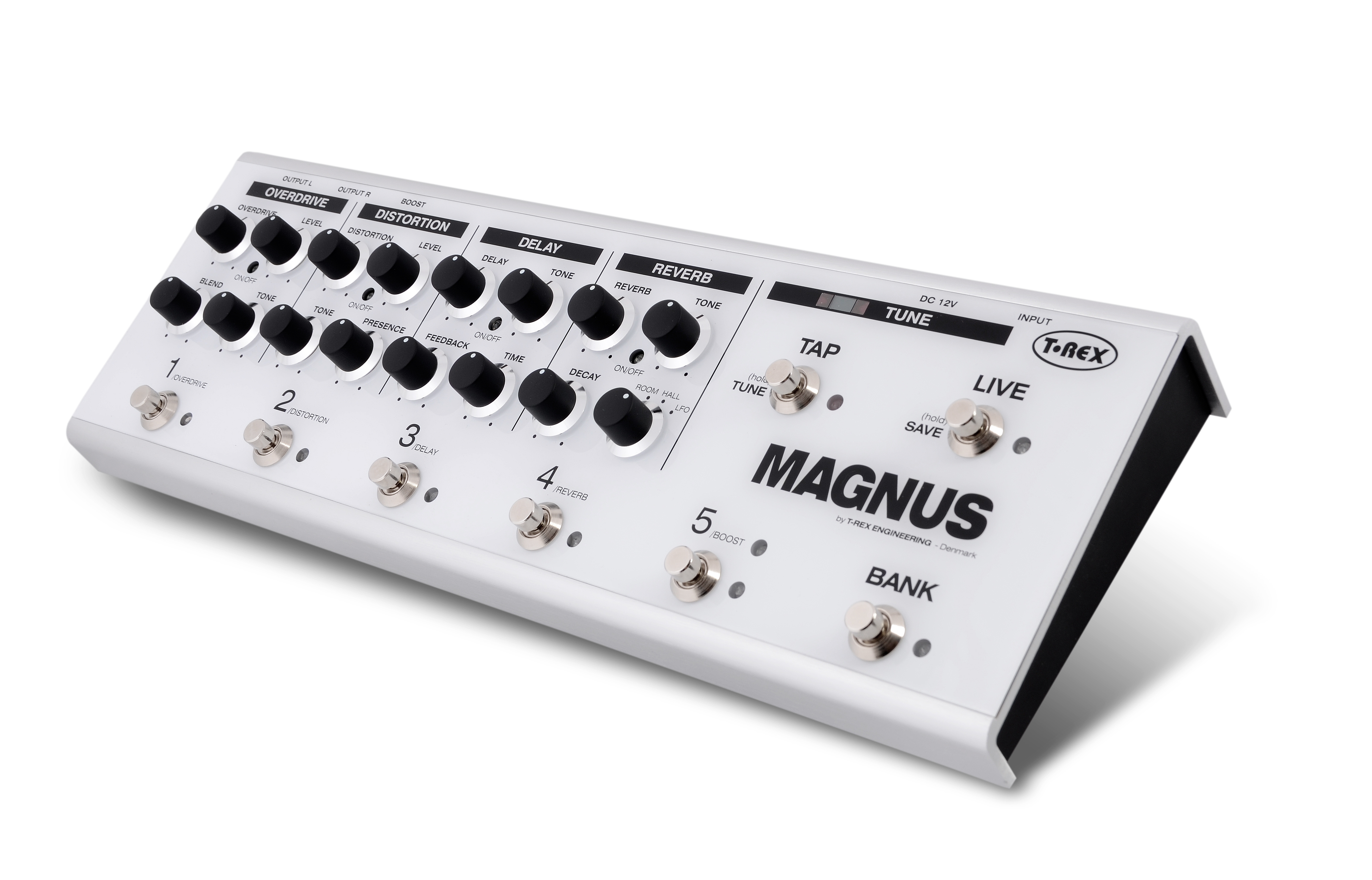Review: T-Rex Engineering Magnus Effect Board

Pedal boards can be the bane of performing guitarists.
They’re complicated and bulky, and if just one connection fails, your rig is rendered silent until you can track down the offending plug or wire.
On the other hand, all-in-one pedal-board solutions are most often maligned for relying too heavily on low-cost, low-fidelity digital-chip sets that don’t deliver the sonic goods of a traditional pedal.
T-Rex’s new Magnus effect board bridges the gap between these two ideologies, offering four of the company’s boutique-quality effects in an easy-to-use, inexpensive and programmable package.
Features
Unlike many multieffect pedal boards, the Magnus’ plug-and-play user interface is easy for any pedal-savvy guitarist to navigate and start to use. There are four pedal sections—overdrive, distortion, delay and reverb—each of which has four control knobs and on/off LED indicators. The overdrive and distortion effects are of the classic British variety, with rich and tube-like tones.
The digital delay sounds smooth, and the reverb is offered in spring, room, hall and LFO (low-frequency oscillation) variations; the LFO setting mixes a chorusing effect into the reverb to simulate the Leslie rotary speaker effect. Additionally, there’s a footswitchable boost circuit (adjustable via a back-panel knob) and a dual-function tap-tempo switch—tap it three times to set the delay speed, or hold it to mute the board and activate the onboard tuner.
Get The Pick Newsletter
All the latest guitar news, interviews, lessons, reviews, deals and more, direct to your inbox!
Players can footswitch between Live and Save modes. In Live mode, the Magnus operates like any a traditional pedal board, where each switch turns the assigned effect and boost on or off. Save mode allows the player to activate any of the 10 programmable combinations of effects with the five numbered switches; the second set of five saved combinations is accessed with the bank switch. The unit has a single input and stereo outputs, and power comes from a supplied 12-volt adaptor.
Performance
Although the delay and reverb are digital effects, the Magnus’ other effects and overall circuitry are completely analog, maintaining a clean signal path that sounds very similar to a multi-pedal setup. In some cases, the Magnus’ performance is improved over separate pedals because the effects are ideally designed to work as a unit.
The overdrive sounds are definitely in the Tube Screamer realm but with a broader midrange band and the ability to mix both dry and overdriven signals via the blend knob. Kicking on the distortion section is like adding a high-gain tube channel to your amp. The effect is crunchy and layered, and it’s possible to create modern metal chunk tones with the presence dialed high. For more pronounced overdrive, simply activate the boost and you’re instantly in ultra-high-gain heaven. The delay and reverbs are noteworthy for their liquid character and absence of noise, sounding much more like ambient, natural-occurring echoes than similar effects at twice the price.
List Price $599
Manufacturer T-Rex Engineering ApS, t-rex-effects.com
Cheat Sheet
Using the Live mode allows players to actively engage any of the four effects and the adjustable boost feature, just as they would with separate pedals.
Players can save 10 preset combinations of effects and boost for convenient and instant recall.
The Bottom Line
Whether you are looking to simplify a bloated and difficult-to-control pedal board or just entering the world of outboard effects, the no-nonsense Magnus effect board from T-Rex Engineering delivers world-class tones and portability at an affordable price.
“The original Jordan Boss Tone was probably used by four out of five garage bands in the late ’60s”: Unpacking the gnarly magic of the Jordan Boss Tone – an actual guitar plug-in that delivers Dan Auerbach-approved fuzz
“This is a powerhouse of a stompbox that manages to keep things simple while offering endless inspiration”: Strymon EC-1 Single Head dTape Echo pedal review









